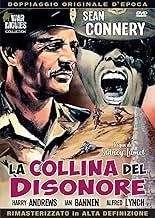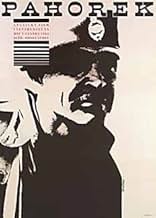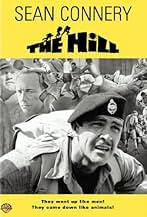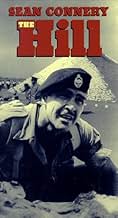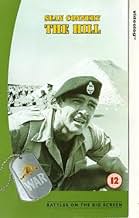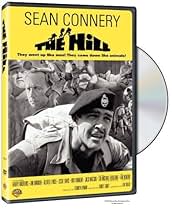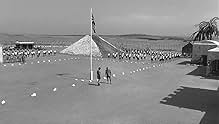In a North African military prison during World War II, five new prisoners struggle to survive in the face of brutal punishment and sadistic guards.In a North African military prison during World War II, five new prisoners struggle to survive in the face of brutal punishment and sadistic guards.In a North African military prison during World War II, five new prisoners struggle to survive in the face of brutal punishment and sadistic guards.
- Won 1 BAFTA Award
- 4 wins & 6 nominations total
Michael Redgrave
- The Medical Officer
- (as Sir Michael Redgrave)
Michael Hawkins
- Prisoner
- (uncredited)
James Payne
- Man in Prison
- (uncredited)
Robert Royal
- Prisoner
- (uncredited)
Harold Sanderson
- Officer
- (uncredited)
Featured reviews
It isn't often Sean Connery makes a film which becomes more memorable than his efforts to make it. Such is the way with a few he decided not mention in his filmography, such as "Safu." You must see it to realize that despite Connery, the film must have a true message. Such is the case with "The Hill." This film does have a message and it is harsh, brutal and to the point. The setting is a British military prison located in the desert and stocked with ex-soldiers who've been court martialed and now must be repatriated by backbreaking discipline, and grim punishment. With inmates coming and going at the prison, it is not too difficult to imagine a new lot which includes Joe Roberts (Sean Connery) a broken Sgt. Major. Pvt. Jacko King (Ossie Davis, who is superb in this role) Pvt. Alfred Lynch, (George Stevens) Pvt. Monty Bartlett (Roy Kinnear) and Pvt. Jock McGrath (Jack Watson). These men and others are new inmates and are pitted against the ruling officers who, will receive as much as they give. This includes the governing Non-commission staff like, Royal Sgt. Major Bert Wilson (Harry Andrews, superb acting) and Sgt. Harris (Ian Bannen) who despite their station are set to collide with each other as well as with the prisoners. Upon entering the prison, the audience is allowed to see how the men will be affected as they are introduced to the punishing ordeal of . . . The Hill. ****
Stark images, powerful script and performances, and rapid, sharp editing make this film difficult to forget. Director Sidney Lumet stamps his authority on the movie with a style that is gritty, almost documentary -like. The quick cuts are precise, like the snap of the salutes and the bark of the NCO's. Beyond Lumet's towering presence, there is a likeable performance from a young Ossie Davis, an excellent early non-Bond performance from Sean Connery, and Harry Andrews' Sargeant-Major is a remarkable creation - a little man whose job is to destroy these misfits on behalf of a system that will not tolerate individuals.
This remarkable film stays in the mind long after viewing for me, mainly because it announces early on that it is not an easy picture, and like early Frankenheimer, it's aggressive style stands out from the norm. It is a quintessential sixties picture - a time when experiments in style could be taken seriously - not just a smirky in-jokes or cartoonish roller -coaster rides. Exhilarating nonetheless.
This remarkable film stays in the mind long after viewing for me, mainly because it announces early on that it is not an easy picture, and like early Frankenheimer, it's aggressive style stands out from the norm. It is a quintessential sixties picture - a time when experiments in style could be taken seriously - not just a smirky in-jokes or cartoonish roller -coaster rides. Exhilarating nonetheless.
Sidney Lumet's The Hill is a stark, uncompromising look at the inside of a British military prison in North Africa during WW II. The all-male film, based on Ray Rigby's autobiographical play, is about the brutal mistreatment of prisoners by the screws at a stockade for court-martialed British soldiers.
The titular 'hill' is a monstrous man-made pile of sand seared by the blazing sun, to be used as a means of punishment in the blistering heat. A sadistic martinet Major Bert Wilson (Harry Andrews) runs the show here with an aim to break the soldier-prisoners down and then build them up to return as soldiers. His fascist method of discipline is to have the inmates clambering with full kit in the heat up and down the dreaded hill even if they are exhausted, as part of a punishment designed more to break a man's spirit rather than provide corrective treatment. The screenplay puts the spotlight on a new bunch of five new prisoners, one of whom is the hard-mouthed tank-man Roberts (Sean Connery). Together, they form an eclectic mix but all have one thing in common: they are terrorized by Sergeant Williams (Ian Hendry), a particularly sadistic new guard chosen by Major Wilson, who relishes the task of marching the men up and down the hill and watching them suffer. When Williams goes too far and causes the death of on the five men due to heat stroke, it sparks off a mutiny and Roberts decides to lodge a charge of murder against Williams. The stage is thus set for a dramatic and riveting confrontation, thrusting the drama to its bruising, ironic end.
In this long and unrelenting documentation of life in a military stockade, Sidney Lumet comes up with the sobering revelation that inhumanity is not unique with the enemy, in his own inimitable style. The cinematography is superlative as Oswald Morris shoots the film in monochromatic hues, making you feel parched from minute one. The acting is also top-notch. Harry Andrews is devastating as the sergeant major that runs the camp - a taut, controlled administrator who is a professional military man and Ian Hendry is brilliantly sinister as the evil sergeant who precipitates the crisis. Connery tears up the screen as the rebellious inmate, giving an intelligently restrained performance, carefully avoiding forced histrionics. Ossie Davis gets some of the best scenes and plays them superbly.
'The Hill' is a harsh, sadistic and brutal entertainment, made without any concessions to officialdom - among the best of the sub-genre has to offer.
The titular 'hill' is a monstrous man-made pile of sand seared by the blazing sun, to be used as a means of punishment in the blistering heat. A sadistic martinet Major Bert Wilson (Harry Andrews) runs the show here with an aim to break the soldier-prisoners down and then build them up to return as soldiers. His fascist method of discipline is to have the inmates clambering with full kit in the heat up and down the dreaded hill even if they are exhausted, as part of a punishment designed more to break a man's spirit rather than provide corrective treatment. The screenplay puts the spotlight on a new bunch of five new prisoners, one of whom is the hard-mouthed tank-man Roberts (Sean Connery). Together, they form an eclectic mix but all have one thing in common: they are terrorized by Sergeant Williams (Ian Hendry), a particularly sadistic new guard chosen by Major Wilson, who relishes the task of marching the men up and down the hill and watching them suffer. When Williams goes too far and causes the death of on the five men due to heat stroke, it sparks off a mutiny and Roberts decides to lodge a charge of murder against Williams. The stage is thus set for a dramatic and riveting confrontation, thrusting the drama to its bruising, ironic end.
In this long and unrelenting documentation of life in a military stockade, Sidney Lumet comes up with the sobering revelation that inhumanity is not unique with the enemy, in his own inimitable style. The cinematography is superlative as Oswald Morris shoots the film in monochromatic hues, making you feel parched from minute one. The acting is also top-notch. Harry Andrews is devastating as the sergeant major that runs the camp - a taut, controlled administrator who is a professional military man and Ian Hendry is brilliantly sinister as the evil sergeant who precipitates the crisis. Connery tears up the screen as the rebellious inmate, giving an intelligently restrained performance, carefully avoiding forced histrionics. Ossie Davis gets some of the best scenes and plays them superbly.
'The Hill' is a harsh, sadistic and brutal entertainment, made without any concessions to officialdom - among the best of the sub-genre has to offer.
Gritty emotional story of men being subjected to ill treatment at a British Army disciplinary camp in the desert. Human drama is of interest to anyone who has been a cog in a corporate machine, not just a veteran. Symbolic of human defiance in the face of rigid rules and inconsiderate authority.
Excellent cast takes every opportunity of limited time frame to give their characters amazing depth. Every character is fully realized and recognizable by anyone who has a few tough life experiences.
Naturally as good as the other actors are, the focus will always be on Connery's screen presence. Here he seems to be portraying his true personality, his face never suited Bond as much. Tough, self respecting and self disciplined sergeant who resolves not to lose his dignity in the face of harsh cruelty. This is an amazing performance, and it's too bad we don't use men like this as role models in modern American society.
As good as the performances are, the best thing about this film is the photography---check out the 360 degree camera movement during the opening sequence. It's a masterpiece which is rare to see even today.
Excellent cast takes every opportunity of limited time frame to give their characters amazing depth. Every character is fully realized and recognizable by anyone who has a few tough life experiences.
Naturally as good as the other actors are, the focus will always be on Connery's screen presence. Here he seems to be portraying his true personality, his face never suited Bond as much. Tough, self respecting and self disciplined sergeant who resolves not to lose his dignity in the face of harsh cruelty. This is an amazing performance, and it's too bad we don't use men like this as role models in modern American society.
As good as the performances are, the best thing about this film is the photography---check out the 360 degree camera movement during the opening sequence. It's a masterpiece which is rare to see even today.
10tully-2
"The Hill" is the first of five films Sean Connery made with Sidney Lumet, and is one of the best, largely because it focuses on ensemble acting, and because each of the actors are up to the task.
The film is set in a North African prison camp during World War II, where a group of five inmates (Connery, Ossie Davis, Roy Kinnear, Alfred Lynch and Jack Watson) have just been assigned. The Sergeant-Major who runs things at the camp (Harry Andrews) has a novel theory about rehabilitation -- break down the wills of the inmates by repeatedly running them up and down a sandy hill built in the middle of the compound, then rebuild them as model soldiers. Despite the martinet-type attitude, Connery and each of his fellow inmates begins to rebel against Andrews and his new, sadistic assistant (Ian Hendry), culminating in the death of one of the inmates and the consequent attempt to cover up the incident.
In black-and-white, Lumet has done a remarkable job of giving the location the feel of hell-on-earth, and his noted ability to work with actors is visible here. Connery is excellent in the second-best performance of his career (the best was his 1973 performance in "The Offence", also with Lumet directing) as a career soldier whose not all that certain that the Army's outdated discipline is worth anything. Equally good performances are turned in by Davis as a West Indian soldier who takes the racist barbs of his jailers and rebels in his own, unique way; Watson as a brutish inmate who begins to develop a conscience; Ian Bannen as a sympathetic guard; Lynch as a sensitive man not meant for the army or jail; Andrews; and Michael Redgrave as the ineffectual doctor who finds courage at the crucial moment.
Probably the best performance, however, is turned in by Hendry as the deeply insecure, sadistic loose cannon of a guard who truly sets events in motion. At once, his performance is villanous, but with an edge of immaturity that makes it almost difficult to hate him -- until the end when the other characters really begin to appreciate just how dangerous he is.
Unfortunately, this film was ignored by the Oscars -- a tragedy especially from some actors who have/had generally been ignored by the Academy and other awards groups (i.e., Connery, Hendry, Andrews, Davis). It did, however, win an award at the Cannes Film Festival for Ray Rigby's superb screenplay.
You may need to listen close to pick up some of the dialogue, but by all means, see it if you get the chance.
The film is set in a North African prison camp during World War II, where a group of five inmates (Connery, Ossie Davis, Roy Kinnear, Alfred Lynch and Jack Watson) have just been assigned. The Sergeant-Major who runs things at the camp (Harry Andrews) has a novel theory about rehabilitation -- break down the wills of the inmates by repeatedly running them up and down a sandy hill built in the middle of the compound, then rebuild them as model soldiers. Despite the martinet-type attitude, Connery and each of his fellow inmates begins to rebel against Andrews and his new, sadistic assistant (Ian Hendry), culminating in the death of one of the inmates and the consequent attempt to cover up the incident.
In black-and-white, Lumet has done a remarkable job of giving the location the feel of hell-on-earth, and his noted ability to work with actors is visible here. Connery is excellent in the second-best performance of his career (the best was his 1973 performance in "The Offence", also with Lumet directing) as a career soldier whose not all that certain that the Army's outdated discipline is worth anything. Equally good performances are turned in by Davis as a West Indian soldier who takes the racist barbs of his jailers and rebels in his own, unique way; Watson as a brutish inmate who begins to develop a conscience; Ian Bannen as a sympathetic guard; Lynch as a sensitive man not meant for the army or jail; Andrews; and Michael Redgrave as the ineffectual doctor who finds courage at the crucial moment.
Probably the best performance, however, is turned in by Hendry as the deeply insecure, sadistic loose cannon of a guard who truly sets events in motion. At once, his performance is villanous, but with an edge of immaturity that makes it almost difficult to hate him -- until the end when the other characters really begin to appreciate just how dangerous he is.
Unfortunately, this film was ignored by the Oscars -- a tragedy especially from some actors who have/had generally been ignored by the Academy and other awards groups (i.e., Connery, Hendry, Andrews, Davis). It did, however, win an award at the Cannes Film Festival for Ray Rigby's superb screenplay.
You may need to listen close to pick up some of the dialogue, but by all means, see it if you get the chance.
Did you know
- TriviaFilming took place in Almería, Spain in a sandy wasteland called Cabo de Gata starting in September 1964 for five weeks on location. An old Spanish fort in Málaga was used for the prison.
Many people associated with the production had regarded the filming as pleasant, despite difficult conditions---The temperatures rarely fell below 115 degrees Fahrenheit (46 degrees Celsius), and despite the 2,000 gallons of pure water that were shipped in for the crew, almost everyone succumbed to dysentery during the shoot.
- GoofsThe first time the new arrivals are shown around "the hill" by Staff Williams, the shadow of the rig is clearly visible as the camera performs a 360 degree shot from the top of the hill.
- Quotes
Trooper Joe Roberts: We're all doing time. Even the screws.
- Alternate versionsColorized version was broadcast over TNT Network June 7, 1989.
- ConnectionsFeatured in The Sun... the Sand... the Hill. (1965)
- How long is The Hill?Powered by Alexa
Details
Box office
- Budget
- $2,500,000 (estimated)
- Runtime2 hours 3 minutes
- Color
- Aspect ratio
- 1.85 : 1
Contribute to this page
Suggest an edit or add missing content


